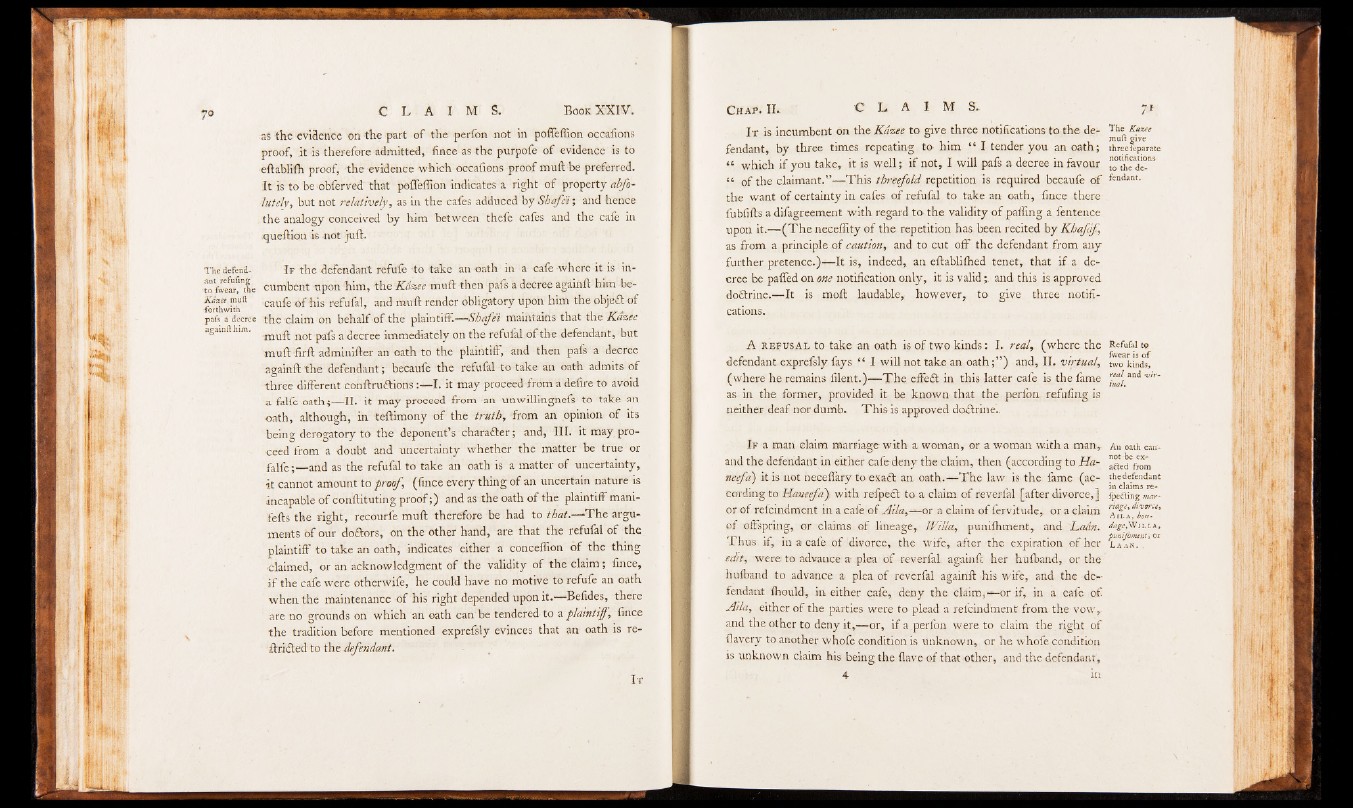
C L A I M S . B o o k XXIV .
as the evidence on the part of the perfon not in poffeffion occafions
proof, i t ;is therefore admitted, fince as the purpofe of evidence is to
eftablifh proof,' the evidence which occafions proof muft be preferred.
It is to be -obferved that poffeffion indicates a. right of property abfo-
lute’lv, but not relatively, as in the cafes adduced by Shafei-, and hence
the analogy conceived by him between thefe cafes and the cafe in
queftion is -not juft.
The defend- I f the defendant refute to take an oath in a cafe where it is in-
g P % cumfoent upon him, the Kdzee muft then pafs a decree againft him be-
Kaas« mult caufe of his refulal, and muft render obligatory upon him the objeft-of
forthwith 7 ; . . . . . ,
pafs a decree the claim on behalf -of the plaintiff— Shafei maintains that the Kazec
againfthim. not pafs a decree immediately on the refufal of-the defendant, but
moft firlt admitiifter an oath to the plaintiff, and then pafs a decree
againft the defendant; becaufe the refufal to take an oath admits of
three different conftruAions:— I. it may proceed from a defire to avoid
a falfe oath;— II. it may proceed from an unwillingnefs to take an
oath, although, in teftimony of the truth, from an opinion of its
being derogatory to the deponent’s character; and, III. it may proceed
from a doubt and uncertainty whether the matter be true or
falfe-,— and as the refufal to take an oath is a matter of uncertainty,
it cannot amount to proof, (fince every thing of an uncertain nature is
incapable o f conftituting proof;) and as the oath of the plaintiff mani-
fefts the right, recourfe muft therefore be had to that.— The arguments
of our doctors, on the other hand, are that the refufal of the
plaintiff to take an oath, indicates either a conceffion of the thing
•claimed, or an acknowledgment of the validity of the claim; fince,
i f the cafe were otherwife, he could have no motive to refufe an oath
when the maintenance o f his right depended upon it.— Befides, there
are no grounds on which an oath can be tendered to a plaintiff, fince
the tradition before mentioned exprefsly evinces that an oath is re-
ftridted'to the defendant.
I t
I t is incumbent on the Kdzee to give three notifications to the defendant,
by three times repeating to him “ I tender you an oath;
“ which if you take, it is well; if not, I will pafs a decree in favour
“ of the claimant.”— This threefold repetition is required becaufe of
the want of certainty in cafes of refufal to take an oath, fince there
fubfifts a difagreement with regard to. the validity of palling a fentence
upon it.— (T h e neceffity of the repetition has been recited by Khafaf,
as from a principle of caution, and to cut off the defendant from any
further pretence.)— It is, indeed, an eftablilhed tenet, that if a decree
be palled on one notification only, it is valid;, and this is approved
doctrine.— It is moft laudable, however, to give three notifications.
A r efusal to take an oath is of two kinds: I. real, (where the
defendant exprefsly lays “ I will not take an oath;” ) and, II. virtual,
(where he remains filent.)— T h e effe£t in this latter cafe is the fame
as in the former, provided it be known that the perlon. refuting is
neither deaf nor dumb. T h is is approved dodtrine..
I f a man claim marriage with a woman, ©r a woman with a man,
and the defendant in either cafe deny the claim, then (according to Ha-
neefa) it is not neceflary to exact an oath.— The law is the fame (according
to Haneefa) with refpeö to a claim of reverfal [after divorce,}
or of refcindment in a cafe of Aila.,— or a claim of fervitude, or a claim
of offspring, or claims of lineage, IVilla, punilhment, and- Ladn.
Thus if, in a cafe of divorce, the wife, after the expiration of her
edit, were to advance a plea of reverfal. againft her hulband, or the
hulband to advance a plea of reverfal againft his wife, and. the defendant
Ihould, in either cafe, deny the claim,— or if, in a cafe of
Aila, either of the parties were to plead a refcindment from, the vow,
and the other to deny it,— or, if a perfon were to claim the. right of
flavery to another whofe condition is unknown; or he whofe condition
is unknown claim his being the Have of that other, and the defendant,
4
The Kazee
muft give
three feparate
notifications
to the defendant.
Refufal to
fwear is o f
two kinds,
real and •virtual.
An oath canr-
not-be ex»-
afled from
the defendant
in claims re-
fpedting marriage,
divorce,
Ail a, bondage,
Wil l a,
punijhment, or
La an. .
Ill